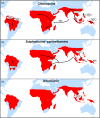Putting evolution in elimination: Winning our ongoing battle with evolving malaria mosquitoes and parasites
- PMID: 29636796
- PMCID: PMC5891050
- DOI: 10.1111/eva.12530
Putting evolution in elimination: Winning our ongoing battle with evolving malaria mosquitoes and parasites
Abstract
Since 2000, the world has made significant progress in reducing malaria morbidity and mortality, and several countries in Africa, South America and South-East Asia are working hard to eliminate the disease. These elimination efforts continue to rely heavily on antimalarial drugs and insecticide-based interventions, which remain the cornerstones of malaria treatment and prevention. However, resistance has emerged against nearly every antimalarial drug and insecticide that is available. In this review we discuss the evolutionary consequences of the way we currently implement antimalarial interventions, which is leading to resistance and may ultimately lead to control failure, but also how evolutionary principles can be applied to extend the lifespan of current and novel interventions. A greater understanding of the general evolutionary principles that are at the core of emerging resistance is urgently needed if we are to develop improved resistance management strategies with the ultimate goal to achieve a malaria-free world.
Keywords: drug resistance; evolutionary medicine; insecticide resistance; malaria elimination; resistance management strategies.
Figures



References
-
- Abdul‐Ghani, R. , Mahdy, M. A. K. , Beier, J. C. , & Basco, L. K. (2017). Hidden reservoir of resistant parasites: the missing link in the elimination of falciparum malaria. Infectious Diseases of Poverty, 6(1), 12 https://doi.org/10.1186/s40249-016-0227-5 - DOI - PMC - PubMed
-
- Adamo, S. A. , & Webster, J. P. (2013). Neural parasitology: How parasites manipulate host behaviour. Journal of Experimental Biology, 216, 1–2. - PubMed
-
- Alout, H. , Dabiré, R. K. , Djogbénou, L. , Abate, L. , Corbel, V. , Chandre, F. , & Cohuet, A. (2016). Interactive cost of Plasmodium infection and insecticide resistance in the malaria vector Anopheles gambiae . Scientific Reports, 6, 29755 https://doi.org/10.1038/srep29755 - DOI - PMC - PubMed
-
- Alout, H. , Ndam, N. T. , Sandeu, M. M. , Djégbe, I. , Chandre, F. , Dabiré, R. K. , … Cohuet, A. (2013). Insecticide resistance alleles affect vector competence of Anopheles gambiae s.s. for Plasmodium falciparum field isolates. PLoS ONE, 8(5), e63849 https://doi.org/10.1371/journal.pone.0063849 - DOI - PMC - PubMed
-
- Alout, H. , Yameogo, B. , Djogbenou, L. S. , Chandre, F. , Dabire, R. K. , Corbel, V. , & Cohuet, A. (2014). Interplay between plasmodium infection and resistance to insecticides in vector mosquitoes. Journal of Infectious Diseases, 210(9), 1464–1470. https://doi.org/10.1093/infdis/jiu276 - DOI - PubMed
Publication types
LinkOut - more resources
Full Text Sources
Other Literature Sources

